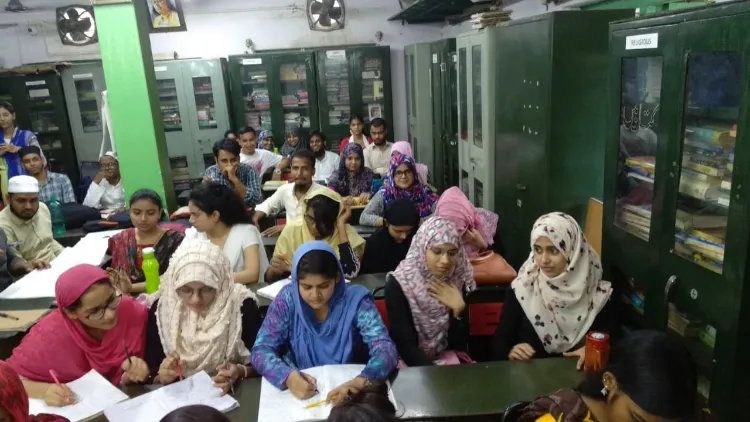
Noorullah Javed/Kolkatta
This is the story of how a library changed the lives of scores of people living in a lower middle-class neighbourhood of Kolkata.
Bell Gachhia Muslim Library, located in the north Kolkata neighbourhood of about 40,000 people, was revived and recalibrated after many years of disuse and it ended up helping youth to realize their dreams.
This library became a focus of youth, who suddenly had a place with facilities to pursue their ambitions of making it into the coveted civil services, as teachers and other government positions.
Muslims generally live in central Kolkata while Bell Gachhia Basti is in the north hence the Muslim leaders never pay attention to it. The area has no representation in the city's Muslim institutions.
However, the area is basking under its new found glory of its young men and women making it to coveted government jobs after clearing the competitive examinations and suddenly other Muslims are wondering about the reason for this change.
The locals say the change is because of the "Bell Gachhia Muslim Library."
This Library was established in 1930 as a repository of religious books, detective novels and literary books.
During the construction of the highway, the library building suffered massive damage as the authorities had dug out an underground metro station beneath the library building in the decade of the eighties. The building collapsed and the library remained closed for some time.
After a long legal battle, the Metro authorities rebuilt the Library, As the collapsed library was in disuse, all the books and record were eaten by termites.
The new library building was inaugurated in 2002 and thereafter the library committee decided to change its basics.
It was converted into a library study center open for boys and girls to study for examinations. It was a boon for the students of the area, who lived in very small houses and lacked a peaceful place to study.
The change began with two men’s one idea. Raees Ahmed, who hails from Bell Gachhia had cleared his civil services examination after a long struggle. He had been a para-teacher and a teacher before he became a civil servant in the State in 2012.
Realising the role that Bell Gachchia Library had played in his life and the reality of many bright Muslims not been able to afford coaching and career guidance, Raees and his colleague Ghulam Afzal, Deputy Commissioner of Revenue (GST), set up the "Academy of Competitive Examinations."
“After our success in 2012, I and Ghulam Afzal decided to set up this organization with the purpose of guiding and providing help to the youth of Bell Gachhia. We started it by renting space but a year later we got an offer from Bell Gachhia Muslim Library to host classes in its premises.”
In 2014, the Library management thus started coaching classes for the West Bengal Civil Services examination with the help of ACE and it proved a milestone for the community’s progress.
In seven years, 86 candidates who had received coaching in this library have joined the Government of Bengal in various capacities after clearing the competitive examinations. Many of them are Assistant Commissioners, Block Development level officers. In the recent examination 10 students from the library, five of whom belong to Bell Guchchia area, have cleared the combined civil services examination.
The library is also used by many non-Muslim students. Jalis says that no institution in Kolkata provides coaching and study material at such a low fee. Some prominent faces who have made successful careers after studying in the library are DSP Ehsan Qadri and Commissioner of Revenue Farah Saleem.
Ansari says they would need more means to expand their coaching. “Our resources are limited, we are deprived of the support of the Muslim leaders of Kolkata,” he claims for six years their frequent meetings with the Library Minister Maulana Siddiqullah Chaudhry have not yielding results.
Raees Ahmed says from his experience he realized that many students get stuck in life because of the lack of proper guidance.
Naseeruddin Khan Jalis, Secretary, Bell Gachhia Muslim Library, who is employed with the Kolkata Tramway says, ‘we have worked hard to bring the library to this place. After a long struggle, we have succeeded in constructing the building of the library which has fallen into disrepair with the help of Metro Railway. Purchase and infrastructure developed.
To raise funds, the Library management has rented out a two-storey building to a school. The revenue generated, thus, goes into the library and supporting coaching and material to the students at a nominal fee. .
Now not only students from Bell Gachhia but Muslim youth from other Kolkata areas also come to study there; they also come from South Bengal, East and West Madnipur.
Ansari says they would need more resources to expand their coaching. “Our resources are limited, we are deprived of the support of the Muslim leaders of Kolkata,” he claims for six years their frequent meetings with the Library Minister Maulana Siddiqullah Chaudhry have not yielding results.
Raees Ahmed says he has found Muslim women students from bell Gachchia more passionate about their studies.
Assistant Commissioner of Revenue Junaid Amir is also a product of the the Muslim Library. He is currently posted at Asansol, 250 kms from Kolkata and yet manages to and time to conduct classes in the Library.
Bell Gachhia library is a shinning spot on Kolkata Muslim and other Muslim Institutions have a lot to learnt from it. For example, a particular community Institute with an annual income of over Rs. 3 million and the West Bengal Urdu Academy that receives a grant of Rs. 150 million annually, have not helped the youth.
That State funded Urdu Academy has been accused of wasting money. It also conducts classes for coaching for the Bengal Service Commission, but its results are disappointing.
